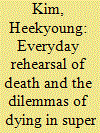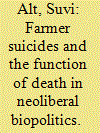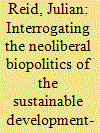|
|
|
Sort Order |
|
|
|
Items / Page
|
|
|
|
|
|
|
| Srl | Item |
| 1 |
ID:
191117


|
|
|
|
|
| Summary/Abstract |
In recent years, a new trend of performing a ‘good death’ has swept Japanese society. Popular, especially among the elderly, shūkatsu (終活) refers to the phenomenon of preparing for one's own demise through various practices, in particular, the writing of an ‘ending note (エンディングノート)’. A will designates the beneficiaries of one's estate or property after one's passing, whereas an ending note not only includes financial and legal matters, it goes far beyond that. It contains provisions for the deceased-to-be's end-of-life treatments, such as hospice care, as well as explicit instructions for seemingly mundane details such as the guest list, flower arrangements, and casket for one's funeral. This trend of engaging in shūkatsu can be viewed as a part of the biopolitics of a super-ageing Japanese society in which the elderly are now expected to manage all aspects of their own lives—including the disposal of their bodily remains when they pass away. Yet, as this anthropologically informed analysis discloses, such biopolitics also gives rise to a new set of ethical dilemmas for the elderly and their families, constituting a new form of politics of life and death. Indeed, rejecting the neoliberal injunction to efficiently separate death from life, many elderly try to recover—and resituate—death within the social and ethical realm of the living.
|
|
|
|
|
|
|
|
|
|
|
|
|
|
|
|
| 2 |
ID:
164645


|
|
|
|
|
| Summary/Abstract |
The farmer suicides that have taken place in India since the 1990s constitute the largest wave of recorded suicides in human history. While existing research largely focuses on explaining the causes that lead farmers to take their own lives, this paper examines the biopolitical governing function that the suicides have. The paper argues that the farmer suicides have functioned to legitimate intervention into the lives of those who remain by either treating them as subjects with mental health problems or educating them on how to embrace a neoliberal entrepreneurial mentality. The farmer suicides arguably also function to dispose of a population that has become surplus in the contemporary developmental vision of the Indian state. Furthermore, the paper contests biopolitical theorization that views suicide or death as resistance to biopower, arguing that such theorization fails to recognize both the particularity of biopolitics in a context where the presence of death is ubiquitous and the way in which the death of some may reinforce the biopolitical governing of life of others. The farmer suicides express rather than contest the devaluation of “unproductive” lives in neoliberal capitalism.
|
|
|
|
|
|
|
|
|
|
|
|
|
|
|
|
| 3 |
ID:
127053


|
|
|
|
|
| Publication |
2013.
|
| Summary/Abstract |
One of the defining features of post-Cold War international relations has been the correlation of development practices and rationalities with those of security, and the emergence of what has been called the "development-security nexus." While the development-security nexus remains relevant, semantic shifts in the conceptualization of both development and security are occurring. Demands for development are increasingly tied not simply to demands for "security," but to a discursively new object of "resilience." And this shift from security to resilience is likewise tied to a reconceptualization of development as "sustainable development." Are these, then, merely semantic shifts, or do they signify changes in the rationalities that have shaped the "development-security nexus" during the post-Cold War period? Are the rationalities that distinguish resilience different to those underpinning demands for security? And are those of "sustainable development" different to what was once known simply as "development"? Does the weaving of a nexus of relations between "sustainable development" and "resilience" represent a departure from the "development-security nexus" in some way? And, if so, what explains that shift and what are its political implications? This article answers these questions through an analysis of the neoliberal biopolitics of the "sustainable development-resilience nexus." While sustainable development deploys ecological reason to argue for the need to secure the life of the biosphere, neoliberalism prescribes economy as the very means of that security. Economic reason is conceived within neoliberalism as a servant of ecological reason, claiming to secure life from economy through a promotion of the capacities of life for economy. This is the paradoxical foundation on which neoliberalism constructs its appropriation of sustainable development. Sustainable development and neoliberalism are not the same, nor is the former simply a proxy of the latter, but they do come into contact powerfully on the terrain of their rationalities of security which, on account of the interplay between ecological and economic reason, is increasingly conceptualized as resilience. This surface of contact ought to make for a tense and political field of contestation, but has instead made largely for a strategically manipulable relation between the two doctrines.
|
|
|
|
|
|
|
|
|
|
|
|
|
|
|
|
|
|
|
|
|